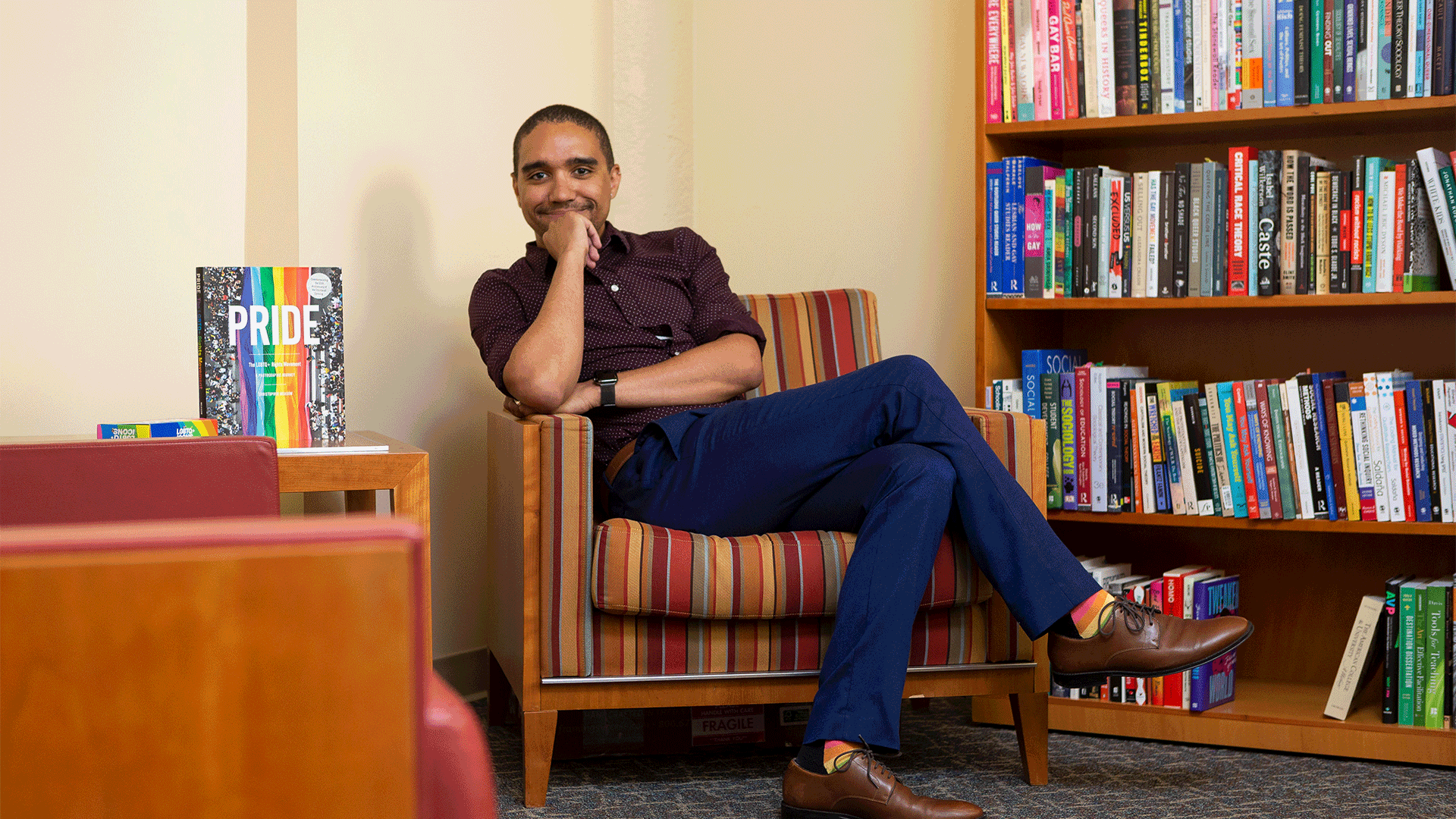- September 12, 2023
- By Sala Levin ’10
Kristopher Oliveira had come out to his family and friends at age 14, and while they were supportive, there wasn’t much of a queer community in his small, suburban hometown outside of Pittsburgh. Determined to find one at Slippery Rock University in western Pennsylvania, he prioritized tracking down the campus LGBTQ center nearly the moment he put his bags down in his dorm room.
Oliveira was soon directed to the basement of the student union, in the back corner of a dimly lit arcade full of pool tables. There, a tiny, wood-paneled room previously used by the hunting and fishing club was the humble home of Slippery Rock’s queer community.
“They had a big rainbow painted on an 8-by-4 wall at the end of the room,” said Oliveira.
Modest though it might have been, the center was the start of a personal and professional journey that brings Oliveira to College Park to take the helm of the University of Maryland’s LGBTQ+ Equity Center as it enters its 25th anniversary year. He started in July as the new director, two years after the retirement of its founder and longtime leader, Luke Jensen.
His overarching goal in his role is to “make sure that every student feels like they belong here,” said Oliveira. “And not just feels it but knows that they’re at an institution that means it, and that we are here to celebrate and uplift.”
At Slippery Rock, Oliveira became a leader in the group, working with the university administration to find a new physical space for the community. Soon, he discovered a passion for researching LGBTQ resource centers and their histories, and for comparing how different institutions operated. Oliveira started at Slippery Rock wanting to be a high school band director (he plays clarinet and saxophone), but ultimately finished with a psychology degree and a plan to go into student affairs.
He went on to earn a master’s degree in higher education from St. Cloud State University before embarking on a doctorate in sociology. “It was thinking about how folks have organized themselves to enact social change in ways that uplift the most marginalized” that excited him about sociology, he said. For his dissertation, Oliveira interviewed 41 LGBTQ resource center professionals “to make sense of what they were called to do in their roles, and how their context or institutional barriers or open gates impact their ability to do that work,” he said.
Before joining UMD, Oliveira put this knowledge to work as assistant dean and inaugural director of Princeton University’s Gender and Sexuality Resource Center. He continues his research pursuits through several national organizations, including as membership engagement director for the Consortium of Higher Education LGBT Resource Professionals, and director of research for the American College Personnel Association’s Coalition for Sexuality and Gender Identities. He’s also working with co-editors on the forthcoming book, “Beyond the Center: Stories and Strategies to Queer Higher Education.”
It's Oliveira’s combination of theoretical and practical knowledge that set him apart from other candidates for the position at Maryland, said Georgina Dodge, vice president for diversity and inclusion. “He has worked in and around equity centers, so he knows how to apply that research very effectively,” she said. “For scholars, being able to understand the limitations of theoretical frameworks is really critical, and Kristopher is very grounded in the reality of how centers operate.”
UMD’s location was one of its draws for Oliveira; positioned near state and national capitals, College Park offered a chance to be “in a place where things are happening” and within “a state-level political system that’s been very affirming for trans people,” said Oliveira. (The easy train ride to New York City also helped—Oliveira’s husband, Alfredo, was a residence hall director at New York University. He joins UMD in September as a program manager in the Honors College.)
Located in a cozy Marie Mount Hall office, lined by bookshelves filled with queer academic texts, memoirs of gay lives and novels, the LGBTQ+ Equity Center is the hub of queer student life on campus. Terps come through the space for meetings of the nine affiliated student groups, to talk over issues with staff members and just to hang out.
Oliveira’s top priority for his first semester is to meet those students and learn from them what their needs are. He hopes to strengthen the center’s offerings for faculty and staff members, and expand educational programming across campus, providing opportunities for discussions on more niche topics like advocacy work. He also hopes to work with alums on events that speak to their expertise or experience.
As the center enters its silver anniversary year, Oliveira plans to celebrate by looking toward the future. “I don’t think it’s a milestone. I think it’s a touchpoint to say, ‘We’re checking in, we’ve been doing really well for 25 years, here are all of our accomplishments, and here’s what’s next on the horizon,’” he said.
Topics
People